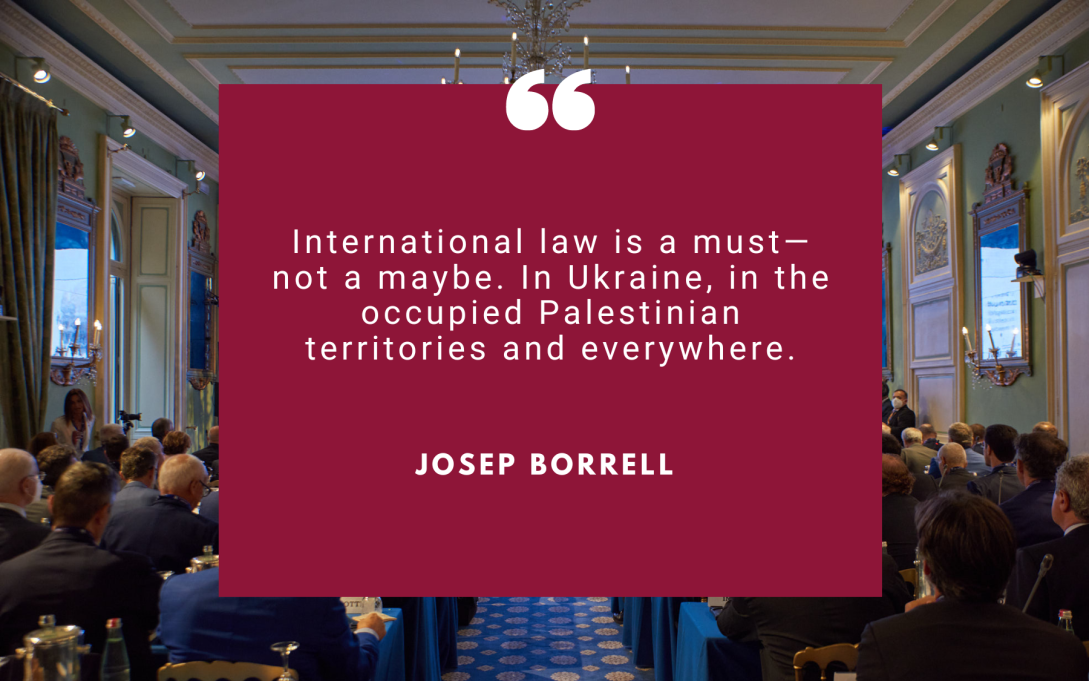Ukraine/Middle East wars: International law is a must—not a maybe

Last weekend, just before travelling to Egypt and Lebanon on a mission to help prevent further escalation in the Middle East, I attended the Ambrosetti Forum in Italy. The historic Villa d’Este, overlooking the serene Lake Como, stood in sharp contrast with the grim realities of war in places like Ukraine, the Palestinian territories, or Sudan.
Two exceptional speakers came to the Ambrosetti Forum to confront us with these harsh realities and remind us about Europe’s responsibility to work toward a just peace in both Ukraine and the Middle East: Ukrainian President Zelenskyy and Queen Rania of Jordan.
President Zelenskyy’s message was unequivocal: Ukrainians want to end this war more than anyone, but not at the cost of their nation sovereignty. Russia has left them no choice but to fight for their survival. He described the daily drone and missile attacks on hospitals, schools, libraries, and residential buildings, which kill ordinary Ukrainians every night. He spoke of underground shelters and of Ukrainian children that learn to read and write in basements and metro stations to protect them from missiles and drones provided by North Korea and Iran.
Zelenskyy thanked Italy and other partners for the air defence systems they provided, but those were not enough to cover Ukraine’s vast territory. Especially because Ukraine still does not have authorisation to strike the airfields and launch sites deep inside Russia from which these attacks originate. This allows the Russian aggressors to bring grief and destruction to Ukraine with impunity from a position of safety.
In my opinion Ukraine should have the capability to target the source of these attacks— to strike the archers, not just the arrows.
We have committed to do whatever it takes to help Ukraine defend itself, and defence means being able to respond to an attack efficiently. In my opinion Ukraine should have the capability to target the source of these attacks—“to strike the archers, not just the arrows.” This is why, during our last informal Foreign and Defence Ministers meeting in Brussels, I supported Ukraine’s right to target key Russian military installations involved in the invasion, wherever they may be, as it is allowed by international law which does not stop at Russia’s border. Some Member States agreed with this position, while others viewed it as a matter of national discretion, so there is not a common EU position in this matter. What is clear, however, is that in the face of Russia’s escalating bombing campaign against civilian targets, the current policy is very costly in terms of Ukrainian lives and affects the credibility of our resolve to support Ukraine.
In the days following the Ambrosetti Forum, President Zelenskyy also discussed this critical question with leaders from the USA and the UK. The discussions are set to continue at the UN General Assembly meeting in New York next week. However, it is essential to understand that this is not about entering into a war with Russia or adding fuel to the fire, as some have suggested. Anyone in President Zelenskyy's position would ask for the very same thing. Because if Ukraine is not allowed to respond by attacking the places from where attacks originate, Russia will continue to destroy Ukraine with impunity.
Queen Rania of Jordan made an emotional appeal to the conscience of Europe: “Try to imagine what it must be like, to not be gathering here beside beautiful Lake Como, but to be a parent in Gaza.” No hospitals. No schools. Almost every neighbourhood in ruins. Whole families starving. “Would any Western population be expected to tolerate decades of occupation, oppression, and violence?” she asked. Yet, in Palestine, this injustice has been rationalized.
To end the bloodshed and forge a just, sustainable peace for both peoples she put forward five principles:
-
First, international law must prevail. Because the conflict can only be resolved if we anchor the effort in a bedrock of impartiality.
-
Second, autonomy, dignity, and human rights are universal and unconditional. Palestinians and Israelis have an equal right to security and self-determination.
-
Third, for justice to prevail, there must be accountability. Because without accountability, a sense of impunity develops, just like in Gaza where policies creating conditions of mass hunger and displacement have faced little international pushback.
-
Fourth, true security is not zero-sum. A just peace makes security mutual.
-
Fifth, voices on the very extreme must be blocked from the conversation.
Queen Rania is right in calling out that, when these principles are violated, mere words of condemnation are not enough.
I subscribe to those principles and believe that anyone in Europe would agree with Queen Rania. However, she is also right in calling out that, when these principles are violated, mere words of condemnation are not enough. Many European leaders have travelled to Israel over the last 10 months expressing their concern and negotiations are ongoing for a ceasefire agreement that could secure the release of hostages and provide humanitarian support to the Palestinians suffering from the horrific situation highlighted by Queen Rania at the Ambrosetti Forum and reiterated days later also by UNRWA Director Philippe Lazzarini in his speech at the Arab League ministerial meeting in Cairo. Countless leaders have also reminded Israel of its obligations as occupying power and branded settlements in the West Bank as illegal. And many have criticised the incitements of violence and hate speeches of Ministers’ Smotrich and Ben Gvir. But unless we agree through an EU common position to act and hold those who fuel the conflict and undermine the two-state solution to account, our words will sound hollow and impunity will continue to prevail.
A week after the Ambrosetti Forum at Lake Como, and only days after visiting the closed Rafah border crossing between Gaza and Egypt, the words of Queen Rania still resonate in my memory. She was saying, “Do not give up. We have to continue asserting that international law is a must—not a maybe. That human rights are not open to negotiation. That without accountability, injustice becomes the norm. That peace—real, lasting, life-affirming peace—is key to security for everybody. And that extreme voices cannot be allowed to dictate our conversation.” Those principles should guide us anywhere.
MORE FROM THE BLOG

“A Window on the World” – by HR/VP Josep Borrell
Blog by Josep Borrell on his activities and European foreign policy. You can also find here interviews, op-eds, selected speeches and videos.
